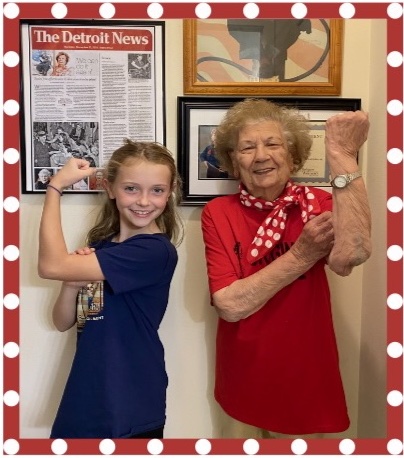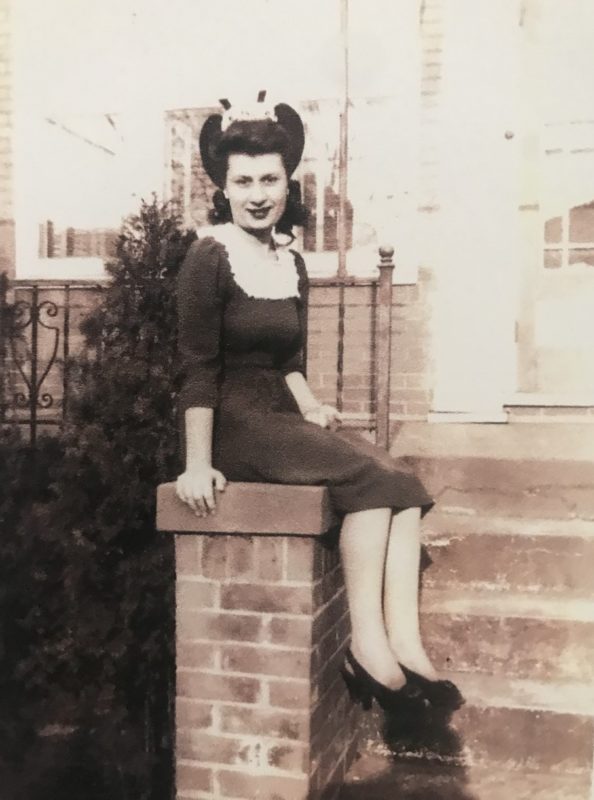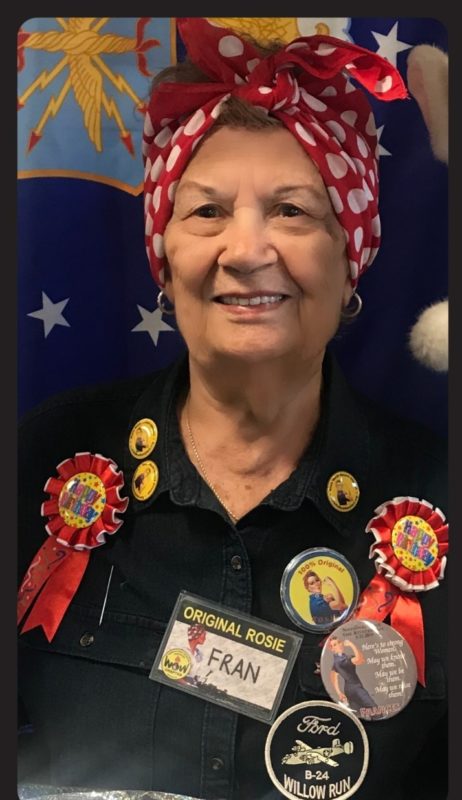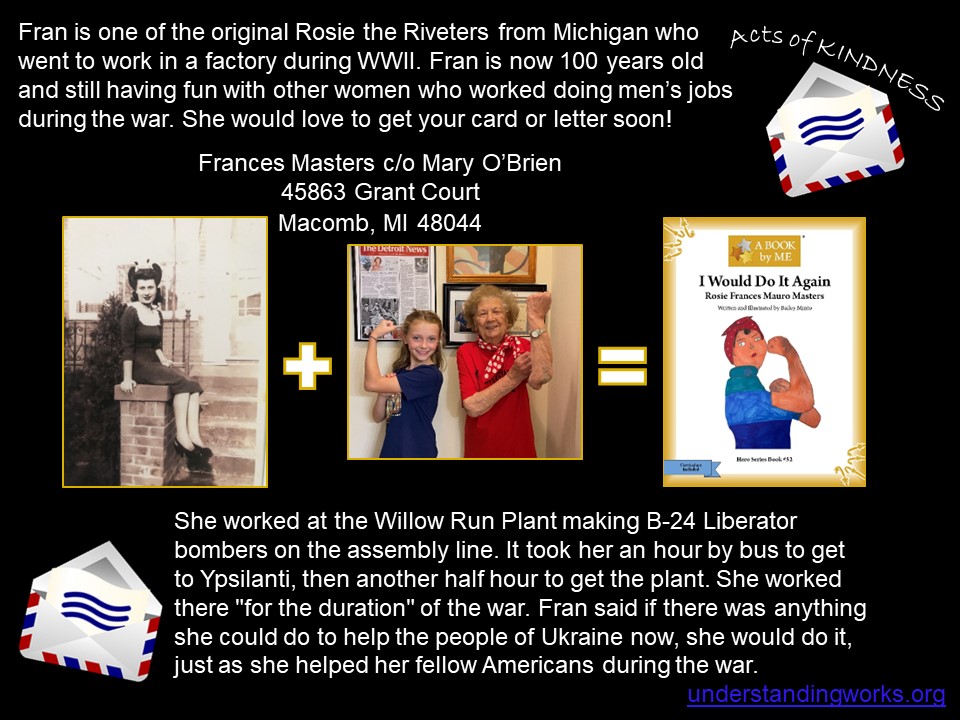Rosie the Riveter
Frances Mauro Masters
"I Would Do It Again"
Written and Illustrated by Bailey Minto
For the series A BOOK by ME - True Stories Written by Kids for Kids
 Frances Mauro Masters is an original Rosie the Riveter living in Michigan during WWII. She went to work on the assembly line at the Willow Run Plant making B-24 Liberator bombers. She worked there for the duration of the war. Young author Bailey Minto had the amazing experience of meeting Fran and hearing her story in person. She wrote and illustrated this important story for young readers.
Frances Mauro Masters is an original Rosie the Riveter living in Michigan during WWII. She went to work on the assembly line at the Willow Run Plant making B-24 Liberator bombers. She worked there for the duration of the war. Young author Bailey Minto had the amazing experience of meeting Fran and hearing her story in person. She wrote and illustrated this important story for young readers.
Frances Mauro Masters – Rosie the Riveter
 In a speech in December 1940, President Franklin Roosevelt referred to the United States as the “Arsenal of Democracy.” His promise to provide arms to our Allies was answered by thousands of women across the nation. One of those women was twenty-year-old Frances Mauro-Masters. She went to work at the bomber plant in Ypsilanti, Michigan in 1942 along with two of her sisters, Josephine and Angeline. They worked there until the end of World War II.
In a speech in December 1940, President Franklin Roosevelt referred to the United States as the “Arsenal of Democracy.” His promise to provide arms to our Allies was answered by thousands of women across the nation. One of those women was twenty-year-old Frances Mauro-Masters. She went to work at the bomber plant in Ypsilanti, Michigan in 1942 along with two of her sisters, Josephine and Angeline. They worked there until the end of World War II.
Her parents were Italian immigrants named Jacqueline and Bartholomew Mauro. They came to America in the early 1900s. Francesca “Frances” was born in 1922 as the fourth of their six children. there were four girls and two boys in their family. She and her sister enjoyed doing gymnastics at nearby Fox theater. They performed on stage there as well. Her father worked graphing trees, and her mother made and sold homemade spaghetti and bread. They modeled hard work for their children.
Frances graduated from Denby High School in Michigan in 1940. World War II had started in Europe the year before when Adolf Hitler of Germany invaded Poland. Then, Pearl Harbor was bombed on December 7, 1941, and America joined the Allied forces. Frances and sisters, Josephine and Angeline, did their parts and got jobs at the Willow Run Bomber Plant operated by the Ford Motor Company. They woke up at dawn and took a streetcar to Detroit, where they were bussed to the plant with the other women. That happened every morning for four years, and a whole new world opened to the girls as they met women from many different states who had come to work in the factory. The sisters weren’t allowed to work in the same department, but they ate their lunch together every day.
Frances, like thousands of other women, was determined to aid her country and support her brothers who were serving in the military. She and her sisters would sometimes joke if they saw a young man in the plant. “He probably has flat feet,” they thought. It was the general rule through World War II that men with flat feet were disqualified from military service.
More than 310,000 women across America were working in factories as well. These women who stepped up and did a man’s job became known as “Rosie the Riveters”. Today, women and young girls all over the world still wear the red and white bandanas as a tribute to honor the legacy of the Rosie’s. Many people don’t know that “Rosie” in Rosie the Riveter ads was a real woman. Rose Will Monroe worked like Frances as a riveter at the Willow Run Aircraft Factory in Ypsilanti, Michigan. She and Frances, alongside many other women, built B-24 bombers for the U.S. Air Force. Monroe was fortunate to be asked to star in a promotional film about the war eort at home. The famous poster we have all come to know and love embodies the spirit of so many of these remarkable women. Because of that poster, “Rosie” continues to be one of the most widely recognized icons of our time! She made history working for Victory! She’s “Rosie the Riveter!”
The red bandanas that were shown on the posters were really worn in the factories and they were functional. Frances remembers a co-worker who stubbornly refused to wear hers, and her beautiful long hair became tangled in a machine. She also remembers her first job was putting small parts together for the wings of the aircraft. Sometimes she was loaned out to another department, where she riveted using an air gun. It was hard work, and she would tell people she lost ten pounds but gained 50 pounds of muscle. She loved working different jobs because she got to meet more people.
Frances and her sisters were able to help provide money for their family, since the girls were paid between $1.00 and $1.25 per hour. That doesn’t sound like much today, but back then this was great pay for either a man or a woman. All the Rosie the Riveters were required to buy war bonds. Frances gave her entire paycheck to her parents and later used her war bonds to pay for her wedding.
Tragically, her brother Salvador (Sam) was killed at the Battle of the Bulge in Belgium in 1945. Approximately 75,000 Americans lost their lives at this battle. Her mother received a telegram saying that Sam had died, KIA. Killed in action (KIA) is a casualty classification used by the military to describe the deaths of their personnel at the hands of the enemy. The death of her brother made Frances want to work harder to win the war. She was proud that the plane she
worked on dropped bombs that helped win the dreadful war that stole so many lives of the young men of the world.
The whole world cheered when the war ended. Like thousands of other families across America, the Mauro family grieved because Sam wasn’t coming home. All families have a very hard time with grief when they’ve lost a son or brother. Their lives went on, but it was never quite the same.
After the war Frances met John O’Brien who lived on the same block. John served in the United States Marines during World War II. Strange they had never met before, but when he returned from the war they finally met at a wedding. They were married and had three children.
Now at age 100, Frances is a member of the Rosie the Riveter Association, where she embodies the spirit of the Rosie’s with her patriotism, kindness, and the way she inspires others. She has a zest for life and has said, “We simply wanted to help our men who went off to war.” She’s also famous for saying, “I would do it again if I could.” She firmly believes that hard work keeps you young.
Frances’s children said this about her service during World War II: “Our mother did not make a big deal of her Rosie years. We knew she worked at a bomber plant but were not aware of its significance. Only years later did we realize how important her contribution was. We are proud of her and thank all of the Rosie supporters who have made “Rosie’s” the heroes they truly are.”
 I Would Do It Again: Rosie Frances Mauro Masters
I Would Do It Again: Rosie Frances Mauro Masters
Written and Illustrated by Bailey Minto
“Hard work and common sense make for a good life.”
Rosie – Frances Mauro Masters
Original Rosie Riveter
“I hope you like reading my story about a woman who’s a hero to me. Rosie the Riveter Frances Mauro Masters says, “You can do it!” No matter how hard the obstacles you’re facing are.” Author/Illustrator – Bailey Minto

Send Fran a card or letter!
Frances Masters
c/o Mary O’Brien
45863 Grant Court
Macomb, MI 48044







